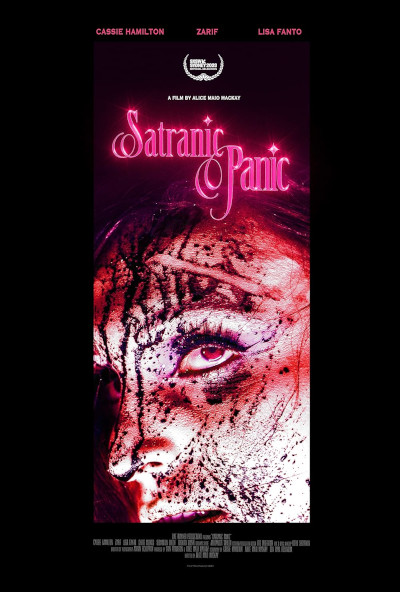Eye For Film >> Movies >> Satranic Panic (2023) Film Review
Satranic Panic
Reviewed by: Jennie Kermode

What do you do when strangers with powerful institutions on their side try to deny your existence, and then try to make you disappear? Your instinct might be to hide away, but history has shown us over and over again that people who do that are easily picked off, one by one; that in fact the best thing to do is to stand up and be loud and unashamed. Alice Maio Mackay has responded to growing up in a transphobic world by blazing a trail through cinema, telling her stories in a wild, dynamic way which nobody who comes into contact with them can ignore. They’re stories full of murder because when you’re young and trans, people around you do keep dying, and horror provides a natural medium through which to explore that. They don’t dwell on victimisation, however. Mackay’s heroines are full of fierce energy; when they encounter injustice, they do something about it.
Nestled in between T Blockers and 2024’s festival favourite, Carnage For Christmas, Satranic Panic is Mackay’s fourth film. She’s 20 now; she was just 18 when she shot it. Like her earlier work, it’s scrappy in places. It gives the impression of having been thrown together in impassioned haste, but if anything that adds to its appeal. Partly a musical, it opens with an elegantly choreographed performance, illustrating what the director can do if she wants to, but then plunges us straight into the action.

The singer, Aria (Cassie Hamilton, who can also be seen in Carnage For Christmas and played Nicole Kidman in another recent trans punk offering, The People’s Joker) is missing her best friend Max, who was recently killed in what the ‘Sadeleide Courier’ refers to as a Satanic ritual. She commiserates with her friend Jay (Zarif), Max’s partner, and is then approached by a scuzzy older man who seems to think he can seduce her. Such men are such a common pitfall that she might easily have written him off as nothing more than that; but some instinct tells her he’s a demon. When confronted about this, he starts lashing about with a Jar Jar Binks-style tongue, and all bloody hell breaks loose.
The bulk of the film follows Aria and Jay’s antics after they decide to hit the road in pursuit of other demons, relying on Aria’s strange instinct for spotting them, and packing a rusty machete which she found in her dad’s shed. You might find yourself wondering for a moment if they are, in fact, just delusional serial killers, but pretty soon another character gets involved in a way that suggests otherwise, and gradually the reason for the demons’ presence becomes clear. There’s a weight of satire here, but it’s dressed up in the tropes of cheery B-movie horror. A conversation which might be interpreted as reflecting on the dynamics of internalised prejudice, for instance, still finds room to include the line “There’s a strip club just outside of town that was an old slaughterhouse.”
This playful approach is an effective one, making the film very watchable and enabling Mackay to direct viewers’ sympathies with ease. The fantastical elements give her a means of establishing, by contrast, what ought to be understood as straightforward and real. The ending is likely to hit queer viewers a lot harder than others, but the way the film celebrates the importance of friendship as much as romantic love is something anybody might appreciate, and it reflects a growing movement in cinema towards setting aside traditional Hollywood notions of reward and celebrating the full range of good things that people find in life. Looked at from a conventional perspective, Aria’s life might seem pretty grim, but Mackay succeeds in shifting the frame, and that’s the kind of cinema that matters.
Reviewed on: 13 Aug 2024
















